Entrepreneurship and Small Business Management Report: UK Development
VerifiedAdded on 2023/01/23
|21
|2232
|93
Report
AI Summary
This report provides a comprehensive overview of entrepreneurship and small business management. It begins by defining entrepreneurship and introducing key concepts. The main body delves into the concept of an entrepreneur, providing examples of different types, such as serial, lifestyle, and innovative entrepreneurs. The report then identifies and investigates various types of entrepreneurial ventures, including small business, scalable start-ups, large company entrepreneurship, and social entrepreneurship, highlighting the similarities and differences between them. The report further explores entrepreneurial typology, correlating different types of entrepreneurs with different venture types, providing real-life examples. It also examines the existence of entrepreneurship in the public sector, illustrating entrepreneurial activities with real-life examples, and defines the scope of development and new entrepreneurial ventures in delivering product innovation to the market. Finally, the report critically examines the development and growth of entrepreneurial ventures in the UK, highlighting the influence of technological advancements and the role of SMEs in job creation, concluding with a summary of the key findings. This report is contributed by a student and is available on Desklib, a platform that provides AI-based study tools.

ENTREPRENEURSHIP AND
SMALL BUSINESS
MANAGMENT
SMALL BUSINESS
MANAGMENT
Paraphrase This Document
Need a fresh take? Get an instant paraphrase of this document with our AI Paraphraser

Table of contents
Introduction
Main body
Conclusion
References
Introduction
Main body
Conclusion
References
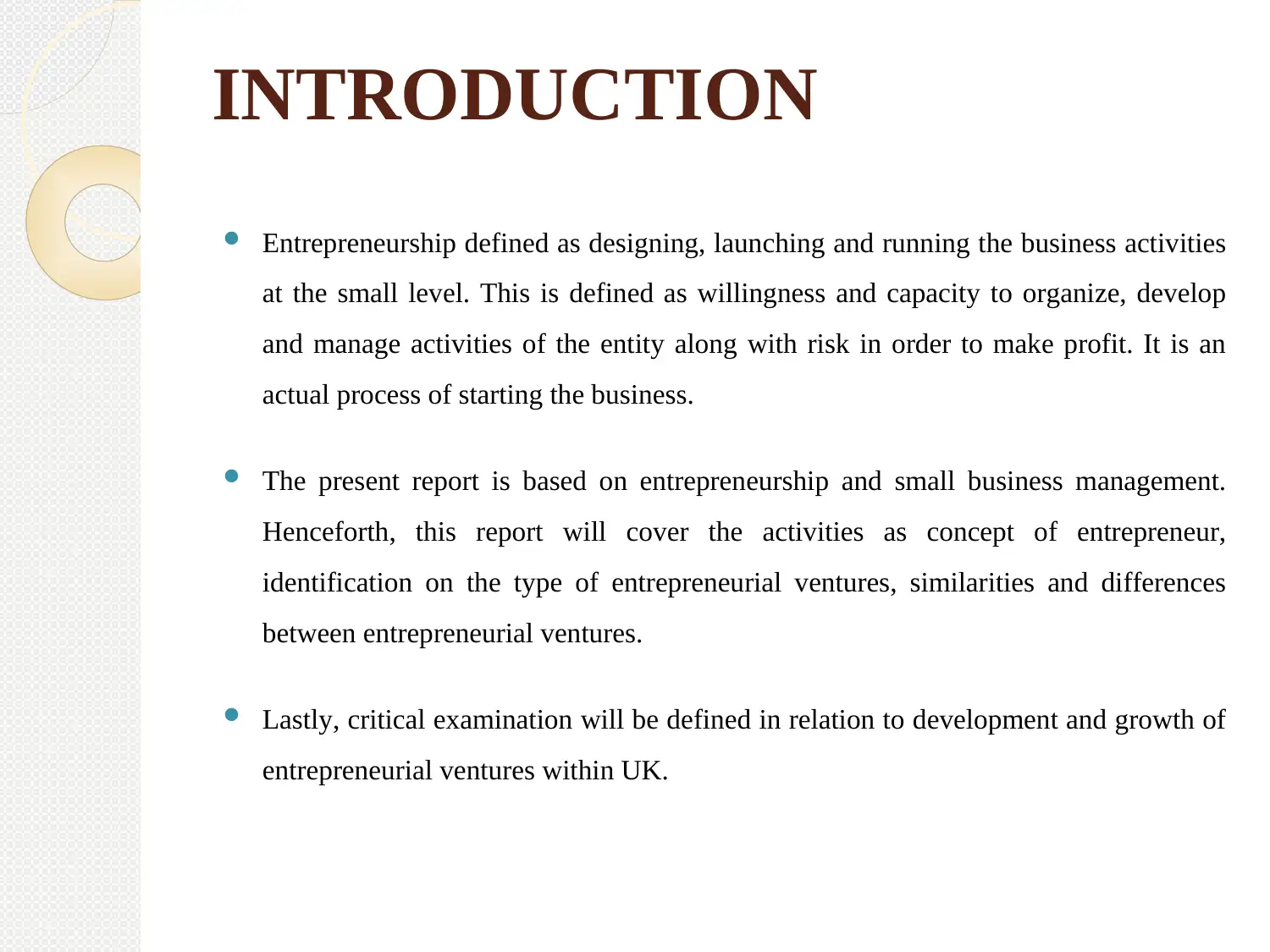
INTRODUCTION
Entrepreneurship defined as designing, launching and running the business activities
at the small level. This is defined as willingness and capacity to organize, develop
and manage activities of the entity along with risk in order to make profit. It is an
actual process of starting the business.
The present report is based on entrepreneurship and small business management.
Henceforth, this report will cover the activities as concept of entrepreneur,
identification on the type of entrepreneurial ventures, similarities and differences
between entrepreneurial ventures.
Lastly, critical examination will be defined in relation to development and growth of
entrepreneurial ventures within UK.
Entrepreneurship defined as designing, launching and running the business activities
at the small level. This is defined as willingness and capacity to organize, develop
and manage activities of the entity along with risk in order to make profit. It is an
actual process of starting the business.
The present report is based on entrepreneurship and small business management.
Henceforth, this report will cover the activities as concept of entrepreneur,
identification on the type of entrepreneurial ventures, similarities and differences
between entrepreneurial ventures.
Lastly, critical examination will be defined in relation to development and growth of
entrepreneurial ventures within UK.
⊘ This is a preview!⊘
Do you want full access?
Subscribe today to unlock all pages.

Trusted by 1+ million students worldwide

MAIN BODY
Paraphrase This Document
Need a fresh take? Get an instant paraphrase of this document with our AI Paraphraser
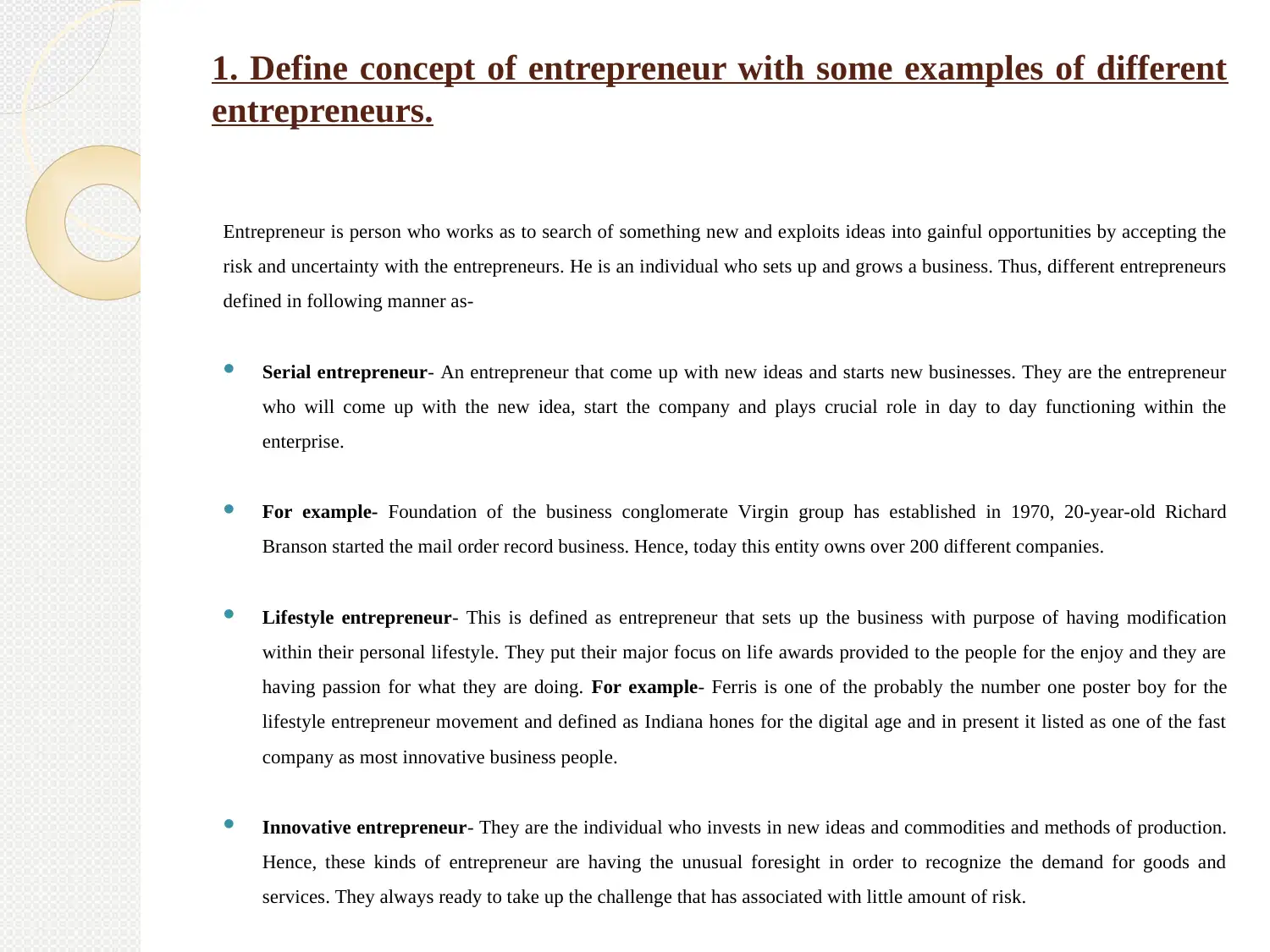
1. Define concept of entrepreneur with some examples of different
entrepreneurs.
Entrepreneur is person who works as to search of something new and exploits ideas into gainful opportunities by accepting the
risk and uncertainty with the entrepreneurs. He is an individual who sets up and grows a business. Thus, different entrepreneurs
defined in following manner as-
Serial entrepreneur- An entrepreneur that come up with new ideas and starts new businesses. They are the entrepreneur
who will come up with the new idea, start the company and plays crucial role in day to day functioning within the
enterprise.
For example- Foundation of the business conglomerate Virgin group has established in 1970, 20-year-old Richard
Branson started the mail order record business. Hence, today this entity owns over 200 different companies.
Lifestyle entrepreneur- This is defined as entrepreneur that sets up the business with purpose of having modification
within their personal lifestyle. They put their major focus on life awards provided to the people for the enjoy and they are
having passion for what they are doing. For example- Ferris is one of the probably the number one poster boy for the
lifestyle entrepreneur movement and defined as Indiana hones for the digital age and in present it listed as one of the fast
company as most innovative business people.
Innovative entrepreneur- They are the individual who invests in new ideas and commodities and methods of production.
Hence, these kinds of entrepreneur are having the unusual foresight in order to recognize the demand for goods and
services. They always ready to take up the challenge that has associated with little amount of risk.
entrepreneurs.
Entrepreneur is person who works as to search of something new and exploits ideas into gainful opportunities by accepting the
risk and uncertainty with the entrepreneurs. He is an individual who sets up and grows a business. Thus, different entrepreneurs
defined in following manner as-
Serial entrepreneur- An entrepreneur that come up with new ideas and starts new businesses. They are the entrepreneur
who will come up with the new idea, start the company and plays crucial role in day to day functioning within the
enterprise.
For example- Foundation of the business conglomerate Virgin group has established in 1970, 20-year-old Richard
Branson started the mail order record business. Hence, today this entity owns over 200 different companies.
Lifestyle entrepreneur- This is defined as entrepreneur that sets up the business with purpose of having modification
within their personal lifestyle. They put their major focus on life awards provided to the people for the enjoy and they are
having passion for what they are doing. For example- Ferris is one of the probably the number one poster boy for the
lifestyle entrepreneur movement and defined as Indiana hones for the digital age and in present it listed as one of the fast
company as most innovative business people.
Innovative entrepreneur- They are the individual who invests in new ideas and commodities and methods of production.
Hence, these kinds of entrepreneur are having the unusual foresight in order to recognize the demand for goods and
services. They always ready to take up the challenge that has associated with little amount of risk.
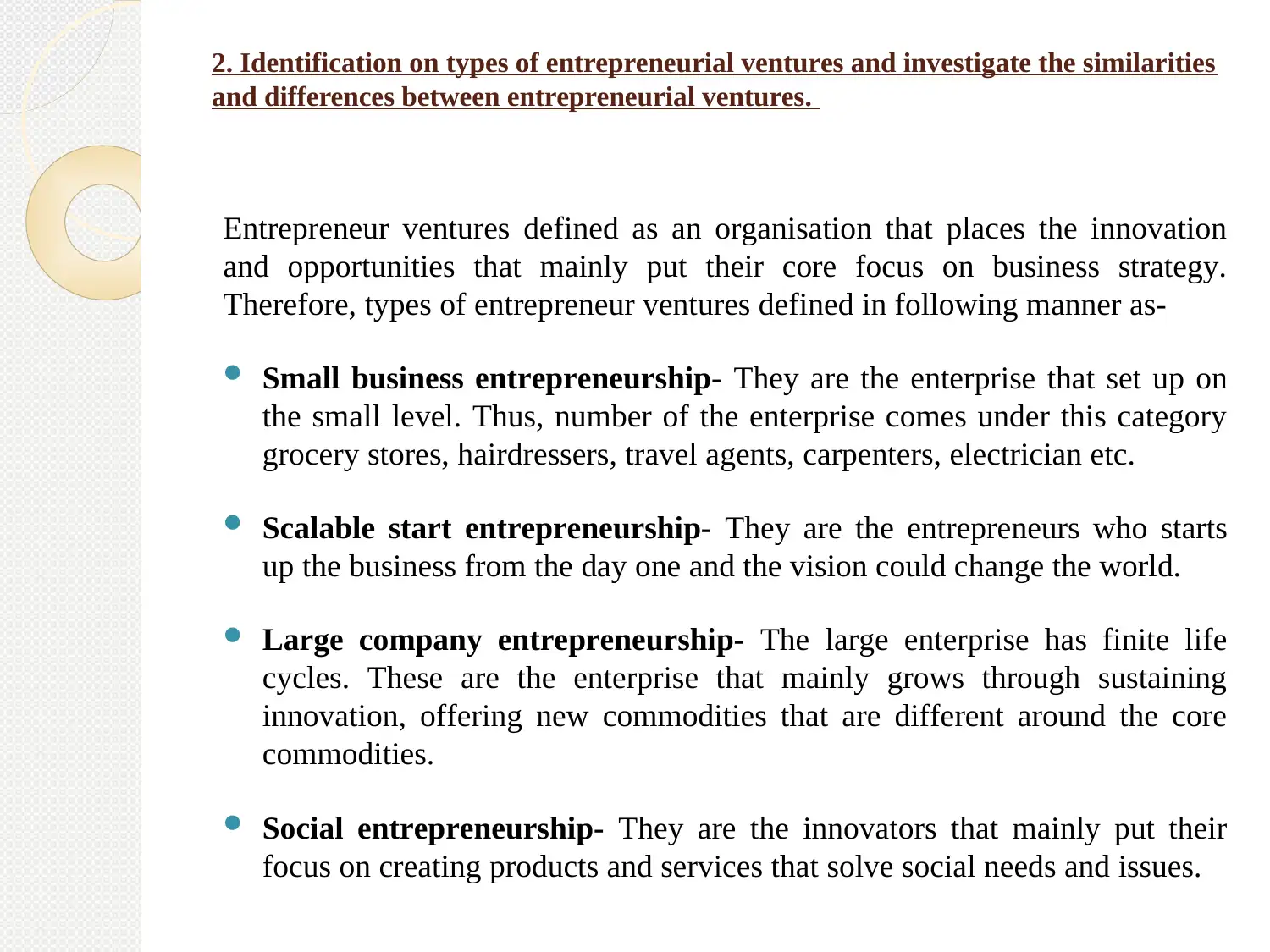
2. Identification on types of entrepreneurial ventures and investigate the similarities
and differences between entrepreneurial ventures.
Entrepreneur ventures defined as an organisation that places the innovation
and opportunities that mainly put their core focus on business strategy.
Therefore, types of entrepreneur ventures defined in following manner as-
Small business entrepreneurship- They are the enterprise that set up on
the small level. Thus, number of the enterprise comes under this category
grocery stores, hairdressers, travel agents, carpenters, electrician etc.
Scalable start entrepreneurship- They are the entrepreneurs who starts
up the business from the day one and the vision could change the world.
Large company entrepreneurship- The large enterprise has finite life
cycles. These are the enterprise that mainly grows through sustaining
innovation, offering new commodities that are different around the core
commodities.
Social entrepreneurship- They are the innovators that mainly put their
focus on creating products and services that solve social needs and issues.
and differences between entrepreneurial ventures.
Entrepreneur ventures defined as an organisation that places the innovation
and opportunities that mainly put their core focus on business strategy.
Therefore, types of entrepreneur ventures defined in following manner as-
Small business entrepreneurship- They are the enterprise that set up on
the small level. Thus, number of the enterprise comes under this category
grocery stores, hairdressers, travel agents, carpenters, electrician etc.
Scalable start entrepreneurship- They are the entrepreneurs who starts
up the business from the day one and the vision could change the world.
Large company entrepreneurship- The large enterprise has finite life
cycles. These are the enterprise that mainly grows through sustaining
innovation, offering new commodities that are different around the core
commodities.
Social entrepreneurship- They are the innovators that mainly put their
focus on creating products and services that solve social needs and issues.
⊘ This is a preview!⊘
Do you want full access?
Subscribe today to unlock all pages.

Trusted by 1+ million students worldwide
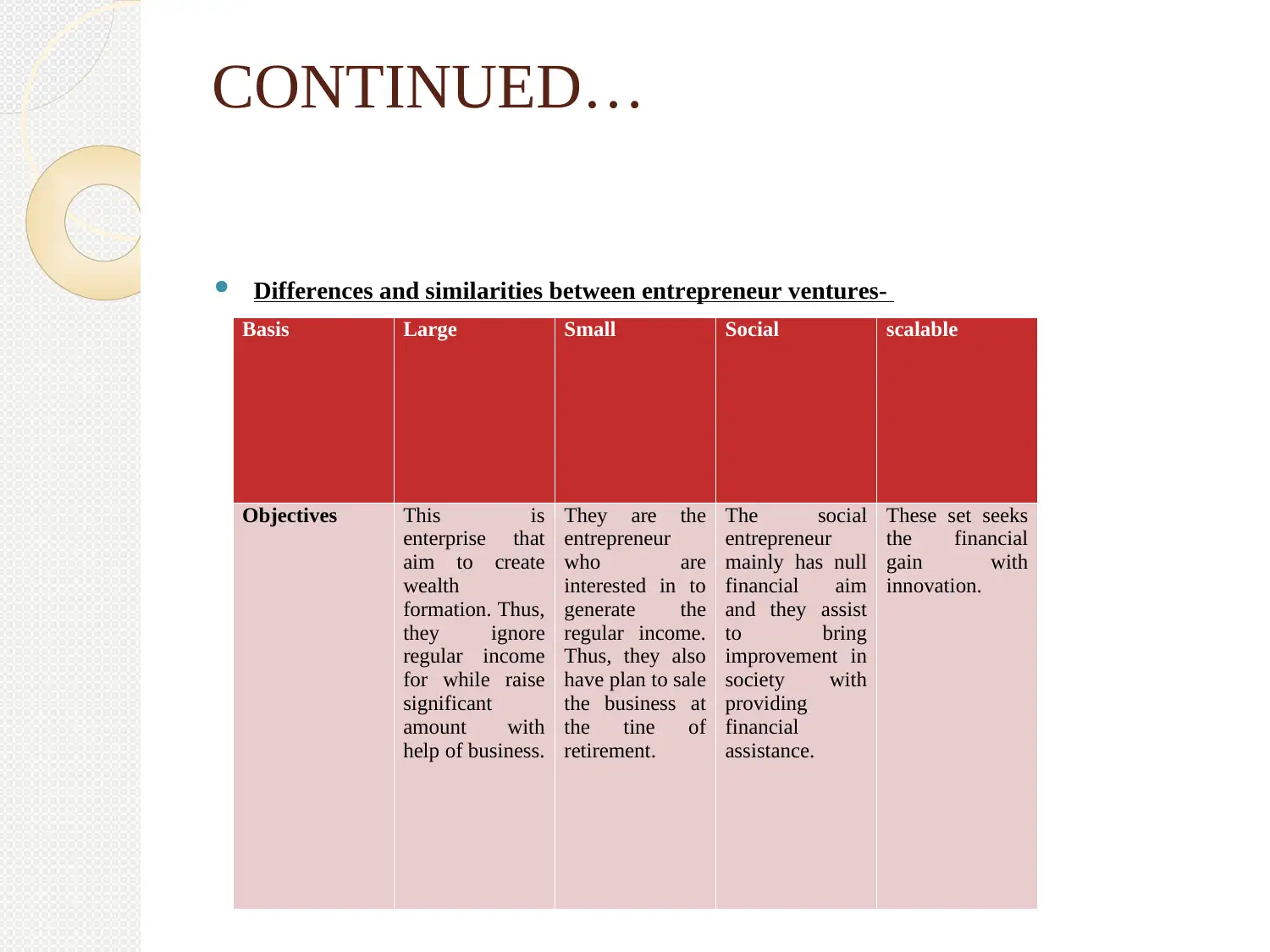
CONTINUED…
Differences and similarities between entrepreneur ventures-
Basis Large Small Social scalable
Objectives This is
enterprise that
aim to create
wealth
formation. Thus,
they ignore
regular income
for while raise
significant
amount with
help of business.
They are the
entrepreneur
who are
interested in to
generate the
regular income.
Thus, they also
have plan to sale
the business at
the tine of
retirement.
The social
entrepreneur
mainly has null
financial aim
and they assist
to bring
improvement in
society with
providing
financial
assistance.
These set seeks
the financial
gain with
innovation.
Differences and similarities between entrepreneur ventures-
Basis Large Small Social scalable
Objectives This is
enterprise that
aim to create
wealth
formation. Thus,
they ignore
regular income
for while raise
significant
amount with
help of business.
They are the
entrepreneur
who are
interested in to
generate the
regular income.
Thus, they also
have plan to sale
the business at
the tine of
retirement.
The social
entrepreneur
mainly has null
financial aim
and they assist
to bring
improvement in
society with
providing
financial
assistance.
These set seeks
the financial
gain with
innovation.
Paraphrase This Document
Need a fresh take? Get an instant paraphrase of this document with our AI Paraphraser

CONTINUED…
Exist value Under this, owner is
ready to take the
higher risk to obtain
high amount of
return. Under it,
valuation can be done
on the periodic basis
to get the best value
for the business.
The owner to the
entity do not measure
the assets value as the
main aim is to earn
the regular cash flow.
They pay less
attention towards exit
value and the assets
valuation.
They sale their assets
when they can have
the best value to the
skill, interest and
hobby.
Financial resources They acquire funds
from the banks,
issuing shares,
debentures and fund
etc.
They arrange money
by themselves with
family and friends.
Social entrepreneur
gets financial aid
from legal authorities,
volunteers and by
own.
They arrange funds
from their personal
savings.
Exist value Under this, owner is
ready to take the
higher risk to obtain
high amount of
return. Under it,
valuation can be done
on the periodic basis
to get the best value
for the business.
The owner to the
entity do not measure
the assets value as the
main aim is to earn
the regular cash flow.
They pay less
attention towards exit
value and the assets
valuation.
They sale their assets
when they can have
the best value to the
skill, interest and
hobby.
Financial resources They acquire funds
from the banks,
issuing shares,
debentures and fund
etc.
They arrange money
by themselves with
family and friends.
Social entrepreneur
gets financial aid
from legal authorities,
volunteers and by
own.
They arrange funds
from their personal
savings.

CONTINUED…
Scope They are the
entities that
have the
capability to
take up the
higher risk.
Therefore, huge
amount of
money, enough
financial options
and enough
financial
options.
These
enterprises are
having
comparatively
limited funding
and low risk of
tolerance. Thus,
market
expansion scope
is medium to
low.
The scope of
social work is
no longer
limited activism.
Thus, it mainly
depends on
retained earning
and desirability
to have
expansion of
business.
The main scope
of scalable
enterprise is to
maintain and
improve the
profit margins.
Scope They are the
entities that
have the
capability to
take up the
higher risk.
Therefore, huge
amount of
money, enough
financial options
and enough
financial
options.
These
enterprises are
having
comparatively
limited funding
and low risk of
tolerance. Thus,
market
expansion scope
is medium to
low.
The scope of
social work is
no longer
limited activism.
Thus, it mainly
depends on
retained earning
and desirability
to have
expansion of
business.
The main scope
of scalable
enterprise is to
maintain and
improve the
profit margins.
⊘ This is a preview!⊘
Do you want full access?
Subscribe today to unlock all pages.

Trusted by 1+ million students worldwide
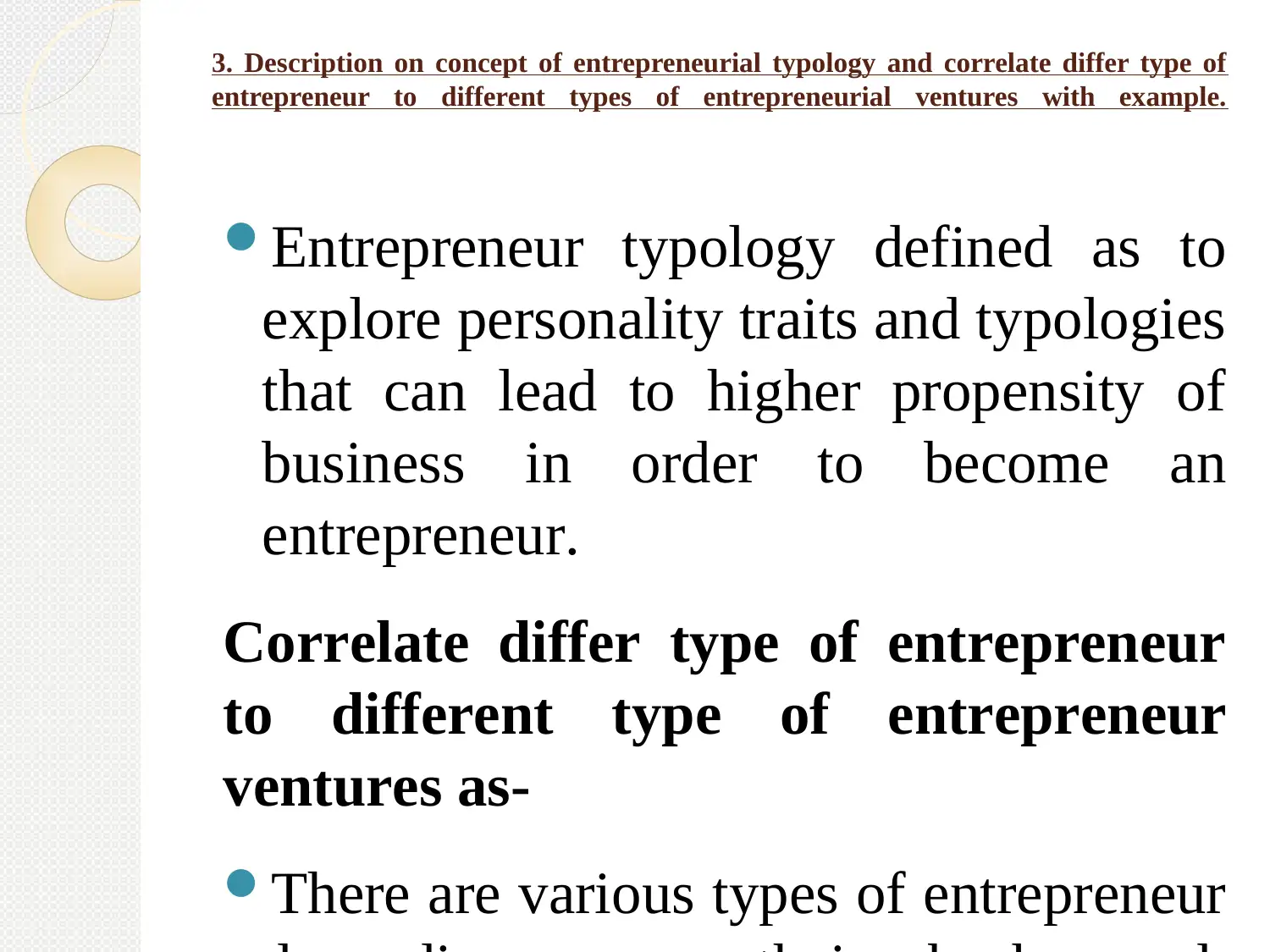
3. Description on concept of entrepreneurial typology and correlate differ type of
entrepreneur to different types of entrepreneurial ventures with example.
Entrepreneur typology defined as to
explore personality traits and typologies
that can lead to higher propensity of
business in order to become an
entrepreneur.
Correlate differ type of entrepreneur
to different type of entrepreneur
ventures as-
There are various types of entrepreneur
entrepreneur to different types of entrepreneurial ventures with example.
Entrepreneur typology defined as to
explore personality traits and typologies
that can lead to higher propensity of
business in order to become an
entrepreneur.
Correlate differ type of entrepreneur
to different type of entrepreneur
ventures as-
There are various types of entrepreneur
Paraphrase This Document
Need a fresh take? Get an instant paraphrase of this document with our AI Paraphraser
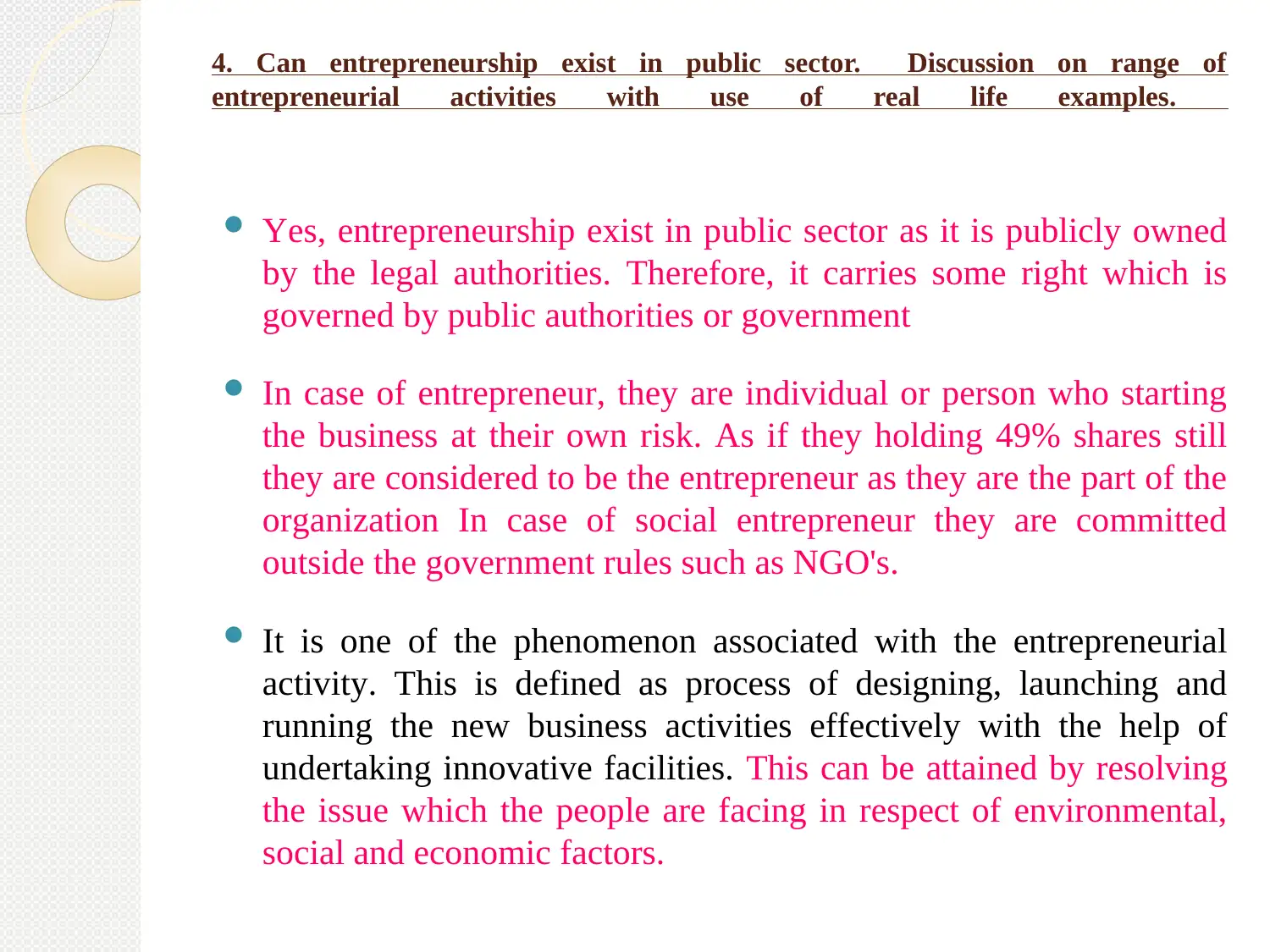
4. Can entrepreneurship exist in public sector. Discussion on range of
entrepreneurial activities with use of real life examples.
Yes, entrepreneurship exist in public sector as it is publicly owned
by the legal authorities. Therefore, it carries some right which is
governed by public authorities or government
In case of entrepreneur, they are individual or person who starting
the business at their own risk. As if they holding 49% shares still
they are considered to be the entrepreneur as they are the part of the
organization In case of social entrepreneur they are committed
outside the government rules such as NGO's.
It is one of the phenomenon associated with the entrepreneurial
activity. This is defined as process of designing, launching and
running the new business activities effectively with the help of
undertaking innovative facilities. This can be attained by resolving
the issue which the people are facing in respect of environmental,
social and economic factors.
entrepreneurial activities with use of real life examples.
Yes, entrepreneurship exist in public sector as it is publicly owned
by the legal authorities. Therefore, it carries some right which is
governed by public authorities or government
In case of entrepreneur, they are individual or person who starting
the business at their own risk. As if they holding 49% shares still
they are considered to be the entrepreneur as they are the part of the
organization In case of social entrepreneur they are committed
outside the government rules such as NGO's.
It is one of the phenomenon associated with the entrepreneurial
activity. This is defined as process of designing, launching and
running the new business activities effectively with the help of
undertaking innovative facilities. This can be attained by resolving
the issue which the people are facing in respect of environmental,
social and economic factors.
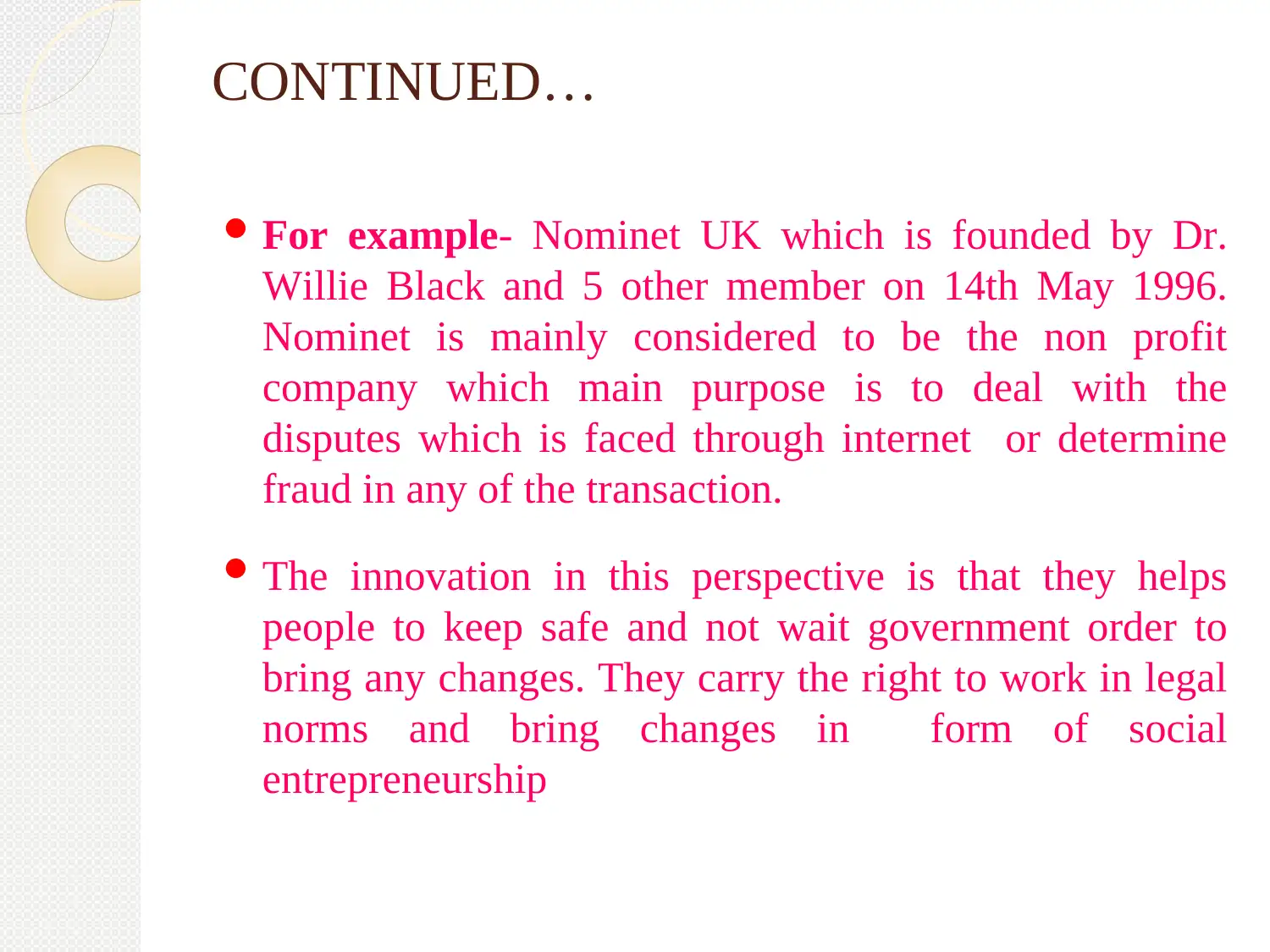
CONTINUED…
For example- Nominet UK which is founded by Dr.
Willie Black and 5 other member on 14th May 1996.
Nominet is mainly considered to be the non profit
company which main purpose is to deal with the
disputes which is faced through internet or determine
fraud in any of the transaction.
The innovation in this perspective is that they helps
people to keep safe and not wait government order to
bring any changes. They carry the right to work in legal
norms and bring changes in form of social
entrepreneurship
For example- Nominet UK which is founded by Dr.
Willie Black and 5 other member on 14th May 1996.
Nominet is mainly considered to be the non profit
company which main purpose is to deal with the
disputes which is faced through internet or determine
fraud in any of the transaction.
The innovation in this perspective is that they helps
people to keep safe and not wait government order to
bring any changes. They carry the right to work in legal
norms and bring changes in form of social
entrepreneurship
⊘ This is a preview!⊘
Do you want full access?
Subscribe today to unlock all pages.

Trusted by 1+ million students worldwide
1 out of 21
Related Documents
Your All-in-One AI-Powered Toolkit for Academic Success.
+13062052269
info@desklib.com
Available 24*7 on WhatsApp / Email
![[object Object]](/_next/static/media/star-bottom.7253800d.svg)
Unlock your academic potential
Copyright © 2020–2026 A2Z Services. All Rights Reserved. Developed and managed by ZUCOL.




